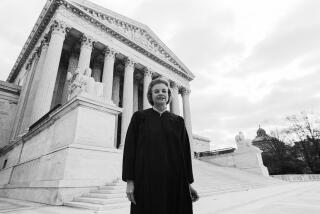Rehnquist Memo Assailed ERA as Destroying Family
- Share via
WASHINGTON — Chief Justice-designate William H. Rehnquist in a 1970 legal memo denounced the proposed equal rights amendment, saying it would “turn ‘holy wedlock’ into ‘holy deadlock’ ” and “hasten the dissolution of the family.”
In urging the Richard M. Nixon White House to oppose the constitutional amendment to ensure equal rights for women, Rehnquist questioned whether “a majority of women really wish to have the only distinction between themselves and men be the preservation of separate restrooms in public buildings.”
This memo, written while Rehnquist was a top attorney in the Justice Department, was disclosed Tuesday by civil rights groups fighting his confirmation by the Senate. It follows a similar disclosure Saturday showing that Rehnquist just two months earlier had proposed a constitutional amendment to halt school desegregation.
Rehnquist’s opponents say that the disclosures bolster the case against the 61-year-old justice by showing that his views are outside the political “mainstream.” His supporters counter that the disclosures demonstrate only what everyone already knew: that Rehnquist is quite conservative.
25 May Oppose Him
Senate Republican leaders, who plan to begin the floor debate Thursday, say his support remains solid. Both Democratic and Republican Senate aides predicted Tuesday that about 25 senators probably will vote against Rehnquist, giving him a comfortable margin of victory.
In 1971, Rehnquist was confirmed as an associate justice on a 68-26 vote.
“I think the margin on William Rehnquist is within two or three votes of what it was the day he was nominated,” said Mark Goodin, spokesman for Senate Judiciary Committee Chairman Strom Thurmond (R-S.C.). “There were 25 votes against him then, and that’s about where it is now. This is a well-orchestrated, selective campaign of disclosures, but I don’t see any evidence of slippage” in Rehnquist’s support.
No Sign of Defections
An aide to Sen. Edward M. Kennedy (D-Mass.), a leading opponent of the nominee, conceded that he saw “no sign” of Republican defections in the Senate vote but added that the critics hope that a debate extending into next week will focus attention on the issue and build opposition.
“While some in the country were watching the committee hearings, the Senate wasn’t,” the Kennedy aide said, noting that such thorny issues as U.S. policy on South Africa were being debated at that time.
The latest disclosure drew sharp comments from feminist leaders, who asserted that Rehnquist’s ERA memo reflected more a “reactionary” mind set than a careful legal analysis.
“The answer to his question is: ‘Yes, women do want equal rights,’ ” said Emily Spitzer, acting legal counsel for the National Organization for Women’s Legal Defense Fund. “I wish I could say I’m shocked by his antiquated views but, in light of everything we know, it fits.”
The proposed amendment, which said that “equality of rights under the law shall not be denied or abridged . . . on account of sex,” was supported by the Nixon Administration, despite Rehnquist’s advice. It was approved by Congress in 1972 and was later ratified by 35 states, three short of the minimum needed to become law.
Nine-Page Memo
Rehnquist had sent his nine-page memo on the ERA, dated May 4, 1970, to Leonard Garment, special counsel to President Nixon.
“It is highly dubious, in my mind, whether a great majority of American women, to say nothing of American men . . . would support it . . . if they knew the main thrust” of the ERA was “to virtually abolish all legal distinctions between men and women,” Rehnquist wrote.
The ERA, he argued, would eliminate women’s “preferred status under the law,” which exempts them from the military draft, gives them special treatment under Social Security and protects them from working in “hazardous occupations.”
“The granting to women of a rigid, doctrinaire equality in all respects with men” will not benefit women, he said, and would reflect “overtones of dislike and distaste for the traditional difference between men and women in the family unit.”
Rehnquist wrote the memo in response to a White House request for views on ERA, Justice Department spokesman Terry Eastland said Tuesday, and Rehnquist was asked to supply the argument against.
More to Read
Get the L.A. Times Politics newsletter
Deeply reported insights into legislation, politics and policy from Sacramento, Washington and beyond. In your inbox twice per week.
You may occasionally receive promotional content from the Los Angeles Times.










